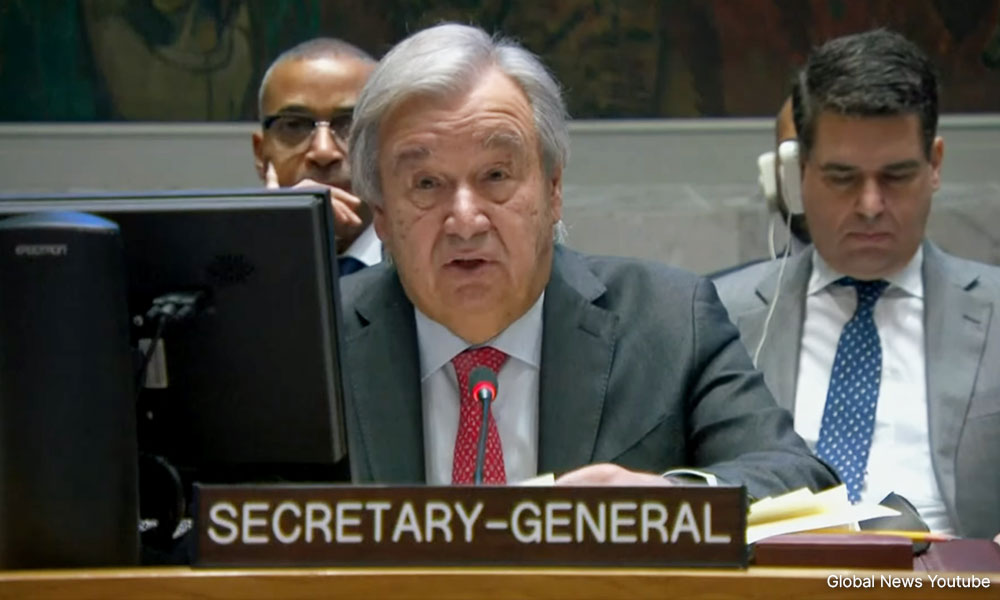To date, we had two Friday protests at Jalan Tun Razak, one of which was graced by the indefatigable Tun. There was also one protest at Dataran Merdeka and one assembly officiated by the prime minister in support of the plight of Palestinians in Gaza.
The United Nations secretary-general, on the 77th anniversary of the UN on Oct 24, 2023, condemned Israel for clear violations of international humanitarian law in its bombardment of Gaza.
He noted the appalling attacks by Hamas on Oct 7 but that “cannot justify the collective punishment of the Palestinian people”.
As events unfolded from Oct 7, an op-ed by Malaysian think-tank Bait al-Almanah in The Diplomat pointed to the possible prominent role Malaysia and Indonesia may play as advocates of the Palestinian cause with more “Arab states choosing to normalise relations with Tel Aviv” with the hope that both Southeast Asian nations may do more in response to the unfolding situation in Gaza.
PAS in its 69th Muktamar called on Malaysia to deliver a protest note against countries that vetoed the motion at the UN Security Council (UNSC) which called for a ceasefire in Gaza to allow for humanitarian access.
Malaysia’s Foreign Ministry on Oct 24, called for UN reform to ensure that the “UN remains fit for purpose”. Protests, let us leave that space for the rakyat. The UN functions and will reform only with the support of the sum total of its member states, of which Malaysia is one.

Jordan, chair of the Arab group and Mauritania, chair of the Organisation of Islamic Conference (OIC) respectively, have requested the chair of the UN General Assembly (UNGA) for an emergency special session under Resolution 377 Uniting for Peace (U4P). The UNGA will convene on Oct 26 for this emergency special session.
We missed the boat. It would have been historic if Malaysia had also requested for the resolution in the UNGA.
The U4P allows governments, regional groups, and civil society groups to push the UN to support a UN peacekeeping operation in Gaza, bypassing the UNSC. It would be important to work with both the UNSC and the UNGA in any case.
Several independent experts to the Human Rights Council in a common statement on Oct 20, denounced the ruthless attacks by Hamas and “stressed their concern for victims of the subsequent counter-terrorism measures by Israel forces.”
This does not stop the Office of the High Commissioner for Human Rights from mandating a fact-finding mission to Gaza to complete an initial report of human rights violations to support any U4P resolution or any outcome in the UNSC.
The last time the Human Rights Commissioner, Volker Turk, spoke to the prime minister was on Aug 16 via telephone. It was an invitation to the celebration commemorating the 75th anniversary of the Universal Declaration of Human Rights.
Volker was formerly the head of the UN Refugee Office in Malaysia. Perhaps Malaysia could explore this fact-finding option with the High Commissioner.
Peace operations
Are there peace operations operating outside of the UNSC and the UNGA U4P?
The African Union (AU) has experience in peacekeeping. The AU peace initiative was, in part, prompted by the divided UNSC.
They and regional economic communities in Africa (Ecowas, OAU, Eccas, SADC, CEN-SAD and EAC) have authorised 30 peace operations, comprising more than 70,000 personnel across 25 African countries.
The AU alone has authorised 22 operations with one UN-AU hybrid peacekeeping operation in Darfur from 2007-2020.
The AU peace operations have a special mention as a regional cooperation on peace in the UN secretary-general’s The New Agenda for Peace (2023). If the multilateralism of Western liberal hegemony is on the decline, the UN will look to similar regional groups to support the UN in its primary role to maintain international peace.
A UN peacekeeping operation is limited by its mandate. It could be a cease-fire and peace enforcement, it could be the monitoring of a ceasefire agreement, or it could be a multidimensional mission, establishing governance and the rule of law.
Perhaps this time also marks an important time in the failing multilateralism of “Western (governments) liberal hegemony”, for a people-to-people alliance including civil society organisations.
We are feted daily with growing public demonstrations on a global scale for peace in Gaza and justice for Palestinians which may develop as a united peoples’ alliance to lobby our own governments and lobby other groups to convince their governments and the UN to move the U4P.
People-to-people alliances are only limited by their imagination. Even as we speak, groups of NGOs are calling for a coalition of countries to expel Israel as was done earlier in Apartheid South Africa, through a resolution in the UNGA. - Mkini
SALBIAH AHMAD was a civilian with the UN political mission in Afghanistan and the UN Peacekeeping Operations in Darfur, Sudan, and the Republic of South Sudan. The views here do not represent those of the United Nations.
The views expressed here are those of the author/contributor and do not necessarily represent the views of MMKtT.




No comments:
Post a Comment
Note: Only a member of this blog may post a comment.